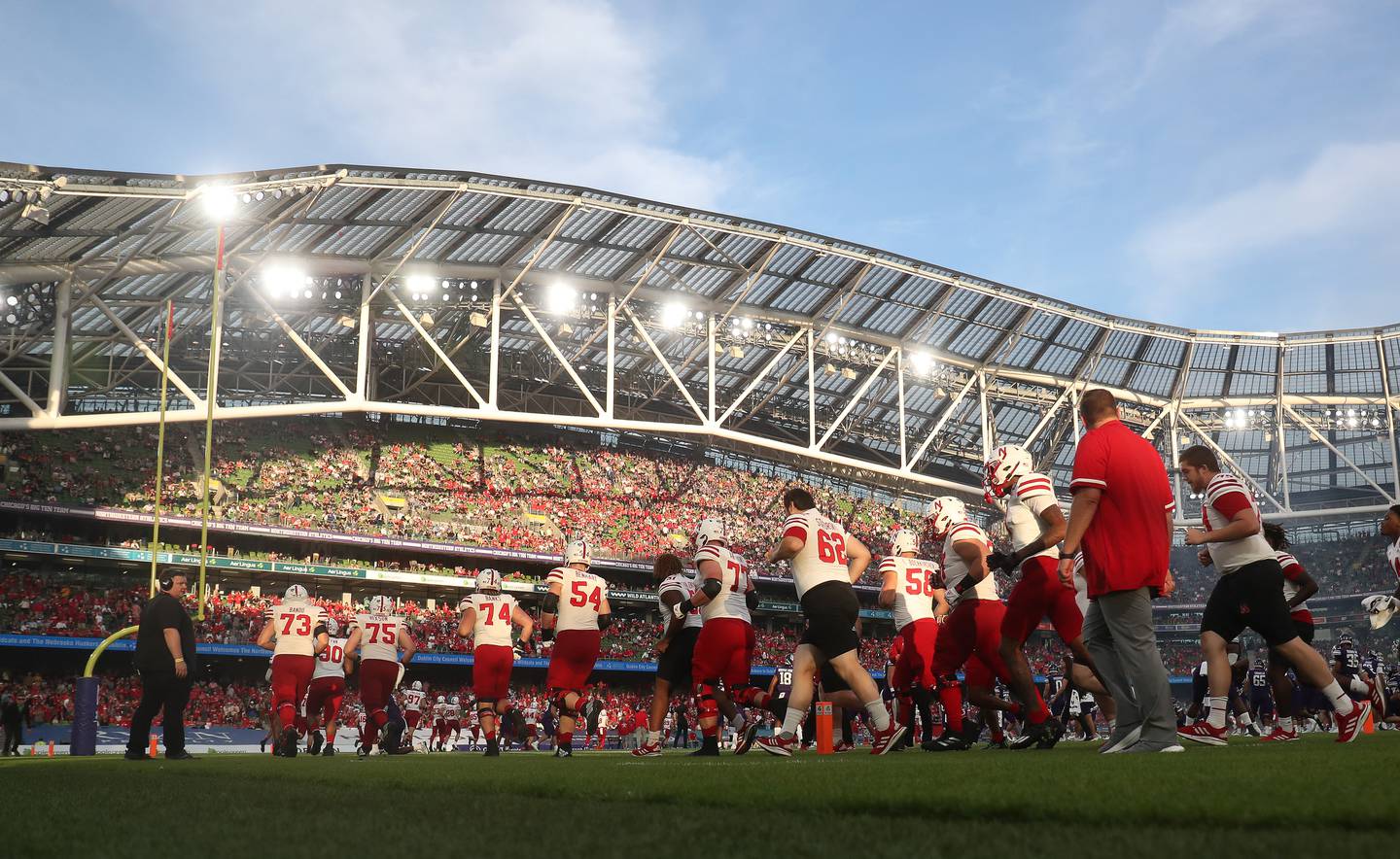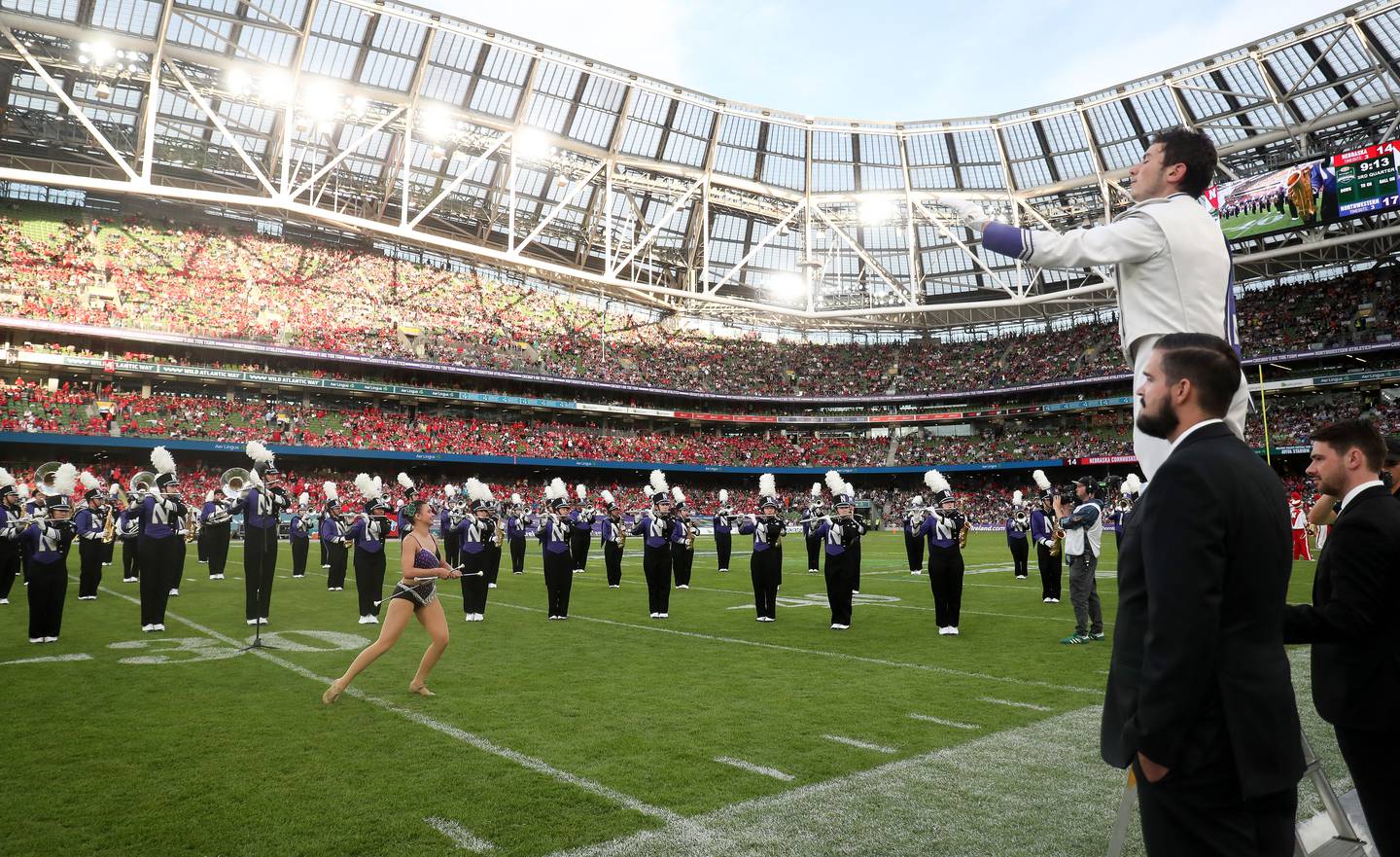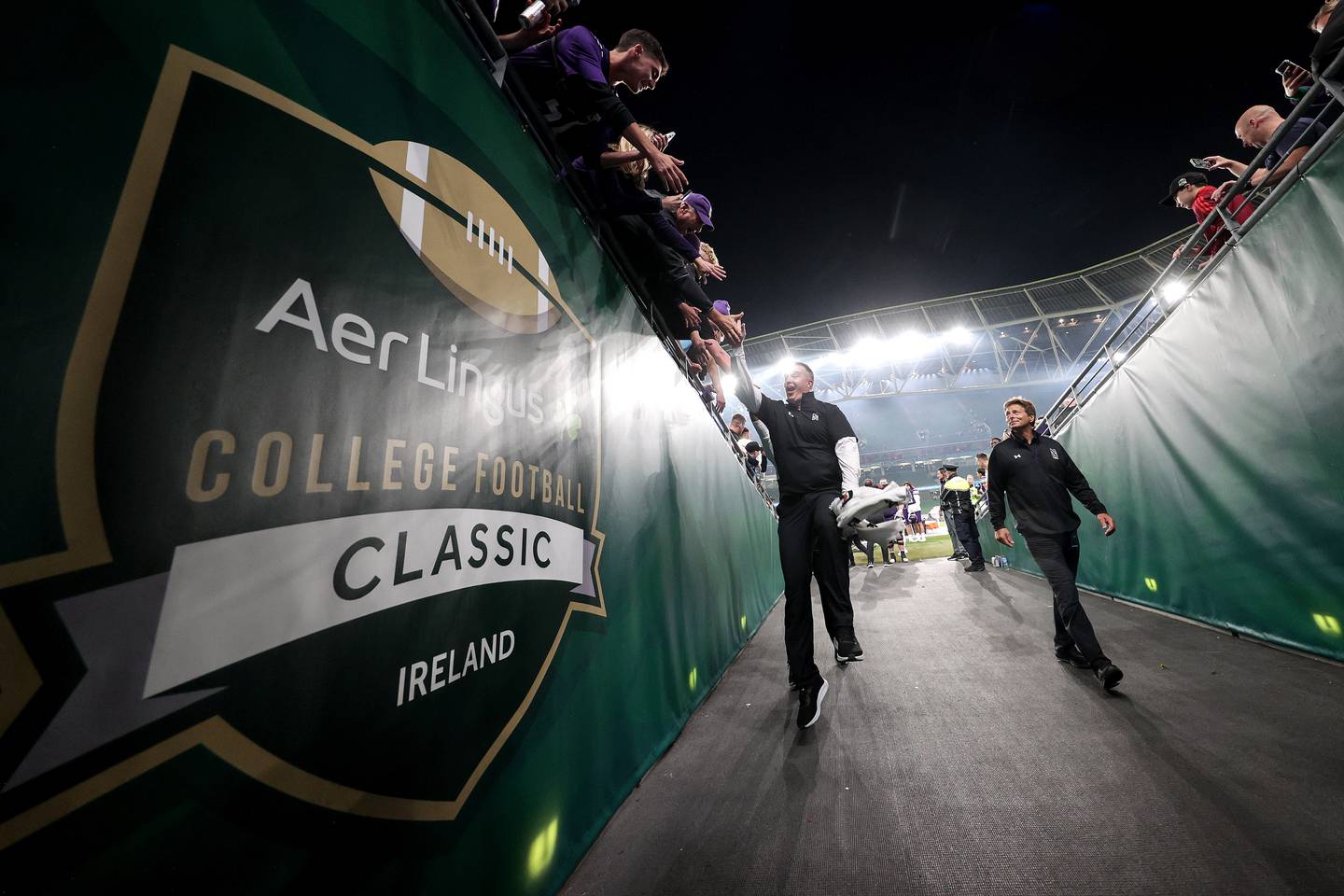Dave Hannigan: Ritual abuse in locker room puts American college football beyond the pale
A rookie making a mistake in training or during a game for the Northwestern University Wildcats was punished with “running”. Not actual laps; this was just the code name given to something involving eight or 10 senior players donning Purge masks, pinning the neophyte down in the locker room and then “dry-humping” him as the rest of the squad watched on. Those designated to be disciplined had their names written on a whiteboard called “Shrek's List” and, at Thanksgiving and Christmas, special holiday-themed versions of the assault were dubbed “Runsgiving” and “Runsmas”.
Other penalties dished out by the kangaroo court included freshmen being ordered to strip and to perform naked slingshotting (firing themselves across the floor of the locker room with exercise bands), naked pass-rushing, and naked bear-crawling on all fours. They also had to participate in a ritual called the car wash, in which senior players soaped themselves up, stood naked blocking the entrance to the showers, and started spinning like human brushes, forcing younger colleagues to rub against them. Then, they turned a power hose on the underclassmen.
Another cherished custom at one of the most respected set-ups in the American collegiate game required a first-year player to perform a centre-quarterback exchange, the moment when the ball is passed back through the linesman's legs at the huddle, while completely naked. When one individual objected, team-mates threatened him with a good, old-fashioned “running”. So, he chose the nude drill instead, a fact reported by the Daily Northwestern, the campus newspaper which has exposed widespread hazing, all recounted in excruciating detail by a victim.
“It's done under this smoke and mirror of, ‘oh, this is team bonding,'” said the former player, “but no, this is sexual abuse.”
No word yet on whether the Wildcats indulged themselves in this carry-on during their celebrated visit to Dublin to take on the Nebraska Cornhuskers at the Aviva Stadium last August. Back then, Northwestern was styled the “respectable” face of college gridiron, coming to Ireland to play a rival with a tawdry reputation stretching back decades. Turns out, the “good” guys were not exactly that, posing yet more serious questions about the wisdom of entities such as the Department of Tourism and Aer Lingus importing this particular slice of Americana on a now annual basis.

Whenever a story of this ilk breaks, there is always an unseemly rush to defend and/or deny initial reports. This past week, many in the college football industrial complex, like the members of a cult they often appear to be, came to the aid of Pat Fitzgerald, Northwestern head coach, arguing this wonderful character could not possibly have known this was going on.
Aside from the fact it was advertised on a locker room whiteboard, there is also the small matter of Fitzgerald, like all other clipboard Svengalis, having a hard-won reputation over 17 years for knowing everything about his players. Except when they, ahem, do really bad stuff.
After one of his former charges made formal allegations about hazing to the university back in November, an outside firm investigated and concluded the claims were “largely supported by the evidence”. The authorities responded to this report by issuing a milquetoast press release last Friday afternoon, the traditional dumping ground for bad news, and suspending Fitzgerald for two meaningless weeks.
This attempted burial of the episode prompted the whistleblower to reach out to the student newspaper, and their more detailed version of the story went viral so fast the college president quickly issued another statement admitting his punishment for the coach may not have fit the crime. And then, when the number of former Wildcats corroborating the charges reached 11, he fired him.

The half-time show during the Aer Lingus College Football Classic 2022 match at Aviva Stadium. Photograph: Oisin Keniry/Getty Images
The fallout has been typically bizarre and troubling. Before Fitzgerald was sacked from his $5.7-million-a-year gig, “the entire Northwestern football team” issued a statement denying any of this ever happened. An emphatic response, except that not one of the 100 or so members of the squad put their name to the document. Things took another sinister turn when some former Wildcats confirmed to the Daily Northwestern (the student journalists involved being real heroes here) they witnessed hazing, and, moreover, incidents of racism too.
[ Wildcats coach eager to touch down on Irish soil at Aviva Stadium ]
African Americans were made to cut their dreadlocks, accused of having “gangster walks”, and constantly reminded by coaching staff they were no longer “in the hood”. A Latino offensive linesman was mocked about his family working cleaning houses and had to shave Cinco de Mayo (the Mexican national holiday) into his head as a freshman.
“I didn't even watch a football game again for almost five years after I left Northwestern,” said Ramon Diaz Jr. “It was that negative of an experience for me.”

Northwestern Wildcats head coach Pat Fitzgerald celebrates with fans as he leaves the pitch at the Aviva Stadium. Photograph: Laszlo Geczo/Inpho
Most Americans will read about this and shrug their shoulders. Like the blatant exploitation of the talents of (mostly) poor black men by (mostly) white coaches earning millions, this is almost an accepted part of toxic college gridiron culture. Everybody knows it is an especially fetid corner of the sports world, made worse by demented alumni willing to defend their alma maters come what may.
But the Northwestern case offers proof that, regardless of the money to be made, nobody in the Department of Tourism, Aer Lingus, Tourism Ireland, Grant Thornton, Glen Dimplex, Wilson Hartnell, Teeling Whiskey, Clayton Hotels, and all the other sponsors, has any business bringing this game to Ireland on an annual basis.
Dublin Football Classic? Far, far from it.
This “Eyes on Trafficking” story is reprinted from its original online location.
Fair Use Notice: The PBJ Learning Knowledge Vault is dedicated to advancing understanding of various social justice issues, including human trafficking and related topics. Some of the material presented on this website may contain copyrighted material, the use of which has not always been specifically authorized by the copyright owner. We are making such material available in our efforts to promote education and awareness of these important issues. There is no other central database we are aware of, so we put this together for both historical and research purposes. Articles are categorized and tagged for ease of use. We believe that this constitutes a ‘fair use' of any such copyrighted material as provided for in section 107 of the US Copyright Law. In accordance with Title 17 U.S.C. Section 107, the material on this site is distributed without profit to those who have expressed a prior interest in receiving the included information for research and educational purposes. For more information on fair use, please visit: “17 U.S. Code § 107 – Limitations on exclusive rights” on Cornell Law School's Legal Information Institute.
 ABOUT PBJ LEARNING
ABOUT PBJ LEARNING
PBJ Learning is a leading provider of online human trafficking training, focusing on awareness and prevention education. Their interactive Human Trafficking Essentials online course is used worldwide to educate professionals and individuals how to recognize human trafficking and how to respond to potential victims. Learn on any web browser (even your mobile phone) at any time.
More stories like this can be found in your PBJ Learning Knowledge Vault.
EYES ON TRAFFICKING
This “Eyes on Trafficking” story is reprinted from its original online location.
ABOUT PBJ LEARNING
PBJ Learning is a leading provider of online human trafficking training, focusing on awareness and prevention education. Their interactive Human Trafficking Essentials online course is used worldwide to educate professionals and individuals how to recognize human trafficking and how to respond to potential victims. Learn on any web browser (even your mobile phone) at any time.
More stories like this can be found in your PBJ Learning Knowledge Vault.
